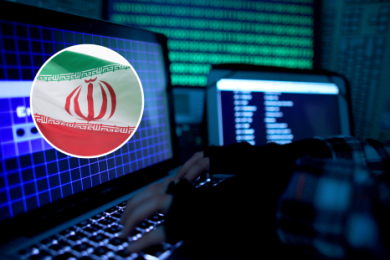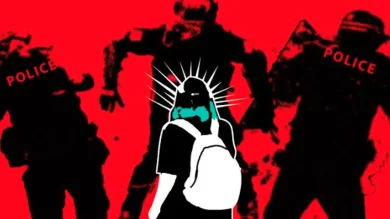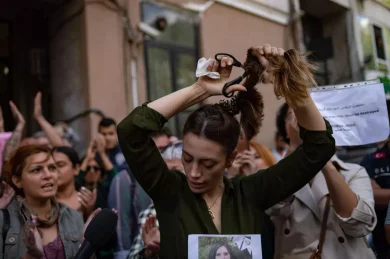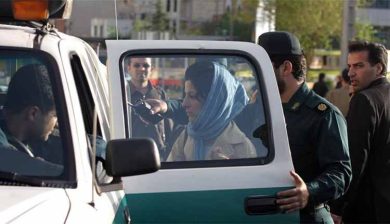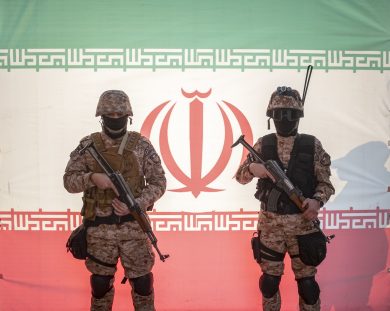Across the globe, the call for women’s rights has taken different forms, shaped by culture, politics, and power. In Iran, the fight for women’s freedom is not only a domestic battle but a powerful message to the world. The “Women, Life, Freedom” movement—led by Iranian women in defiance of the Islamic Republic and its enforcer, the Islamic Revolutionary Guard Corps (IRGC)—has emerged as a defining chapter in global feminism.
This article explores why Iranian women’s voices are vital to the global feminist movement, how their struggle challenges Western-centric views of feminism, and why the international community must recognize and support their leadership.
1. Iranian Women at the Crossroads of Oppression and Resistance
A. Daily Life as Political Resistance
Iranian women face state-sanctioned restrictions on nearly every aspect of life—from compulsory hijab laws and gender segregation, to limited legal rights in marriage, custody, and inheritance. Yet, these limitations have birthed a new wave of resistance:
• Refusing the compulsory hijab in public spaces.
• Using social media to expose state brutality.
• Leading protests, strikes, and underground networks.
B. The Role of the IRGC
The IRGC is not just a military force—it is the architect of repression in Iran. It:
• Controls prisons like Evin and Qarchak where women are tortured and silenced.
• Oversees the morality police.
• Targets women activists and journalists through arrests, surveillance, and cyber warfare.
Despite this, Iranian women persist, redefining courage and civic resistance.
2. From Mahsa Amini to a Movement: A Feminist Uprising
A. The Spark
The death of 22-year-old Mahsa Amini in 2022 while in custody for allegedly wearing her hijab “improperly” ignited global outrage and inspired protests across all 31 provinces of Iran.
B. The Slogan: Women, Life, Freedom
Borrowed from Kurdish feminist movements, this slogan encapsulates the intersection of gender, life, and liberty. It signifies that:
• Freedom for women is central to democracy.
• Violence against women is political violence.
• Feminism in Iran is not imported—it is born from within.
3. Why Iranian Feminism Matters Globally
A. A Challenge to Western Feminist Assumptions
Iranian feminism dismantles stereotypes such as:
• Women in Muslim-majority countries are passive or powerless.
• Feminism must look like its Western counterparts to be legitimate.
Iranian women are fighting for bodily autonomy, political agency, and economic rights in a deeply hostile environment. Their version of feminism is rooted in resistance, survival, and community power.
B. A Universal Struggle
While contexts differ, many feminist issues are shared across borders:
• Gender-based violence
• Control over women’s bodies
• Pay inequality
• Legal discrimination
Iranian women are not “others”—they are part of a shared global fight for liberation.
4. Case Studies: Women Who Are Changing the Game
Narges Mohammadi
• Imprisoned repeatedly for her activism.
• Winner of the 2023 Nobel Peace Prize.
• Her advocacy from prison sheds light on sexual abuse and torture of women in Iranian jails.
Masih Alinejad
• Iranian journalist in exile.
• Founder of #MyStealthyFreedom and #WhiteWednesdays.
• Continues to mobilize global audiences to support Iranian women.
Nasrin Sotoudeh
• Human rights lawyer.
• Defended women arrested for protesting the hijab.
• Sentenced to 38 years in prison and 148 lashes.
Their stories reflect the intersection of courage and consequence.
5. The Role of the Iranian Diaspora in Global Feminism
The Iranian diaspora, especially women, play a critical role in:
• Amplifying stories that state-run media suppresses.
• Organizing protests and awareness campaigns globally.
• Lobbying foreign governments for sanctions against the IRGC and for human rights resolutions.
Their efforts bridge the gap between local resistance and international awareness.
6. How Global Feminists Can and Must Support Iranian Women
A. Amplify Their Voices
• Share stories, quotes, and protest videos.
• Engage with Iranian feminists and creators online.
• Ensure Iranian women’s movements remain part of global feminist discourse.
B. Demand Accountability
• Urge governments to sanction IRGC leaders for gender-based violence.
• Support legal action against those committing human rights violations.
• Push for recognition of gender apartheid as an international crime.
C. Support Digital Freedom
• Donate to organizations providing VPNs and secure communication tools to activists.
• Encourage tech companies to protect Iranian users from surveillance and shutdowns.
D. Include Iranian Voices
• Invite Iranian activists to speak at global forums, UN panels, feminist conferences.
• Translate their writings and stories for global audiences.
• Recognize their unique contributions to the theory and practice of feminism.
7. A Feminism That Listens, Learns, and Acts
Global feminism must be inclusive, intersectional, and actionable. It must:
• Listen to women on the ground.
• Learn from diverse feminist traditions.
• Act in solidarity—not charity.
Iranian women are not seeking rescue. They are seeking recognition, respect, and amplification of their movement.
Conclusion: The World Cannot Stay Silent
Iranian women are not just resisting for themselves—they are redefining what global feminism looks like. They are teaching the world that:
• Freedom is a daily act of defiance.
• Feminism must adapt to context.
• Solidarity is stronger than silence.
Join Our Newsletter!
Stay informed with the latest updates, news, and ways to take action in the fight for justice and global security. Sign up now to get updates delivered straight to your inbox!

